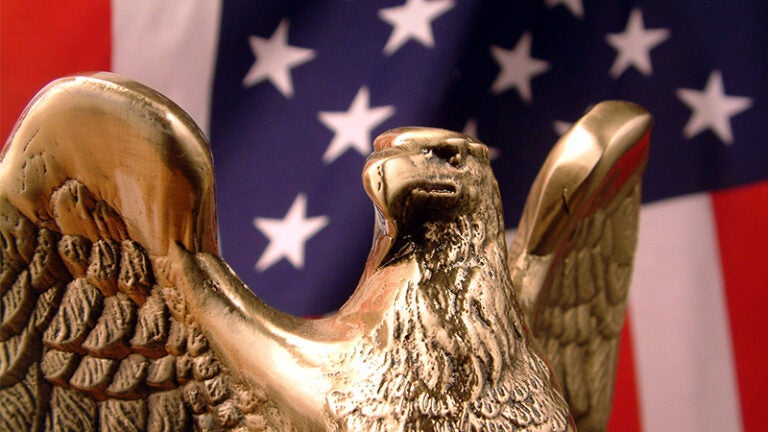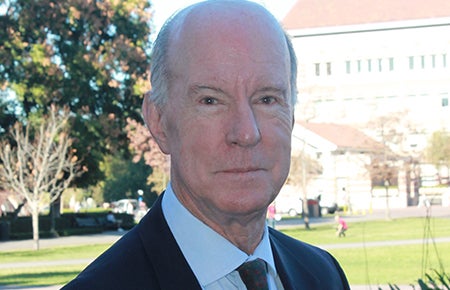
Former intelligence chief now at USC Dornsife counters Trump claim of respect
Until early last year, USC’s Greg Treverton led the National Intelligence Council (NIC), the governmental agency that’s chiefly responsible for analyzing intelligence and giving policymakers unbiased information on global affairs. Today, he’s professor of the practice of international relations at USC Dornsife.
Treverton gave his thoughts on topics related to U.S. intelligence, an issue that has been making headlines since the inauguration of President Donald Trump, which coincided with the end of Treverton’s 2 1/2 year stint as NIC chair.
What are some of the biggest challenges the U.S. intelligence community faces today?

Gregory Treverton, professor of the practice of international relations. Photo courtesy of Gregory Treverton.
Plainly the biggest challenge now is one that I hope won’t be permanent: dealing with a president who knows little about the issues but seems not to trust his own intelligence services, committed officials who work for the country, not for any particular administration, and who would do anything for the president that’s legal.
Dissing them seems to me more than unwise. Alas, even beyond Trump we seem to be moving into a world where truth is subject, personal and relative. For intelligence, that requires doubling down in the sense of remaining committed to trying to tell the truth as best it can be discerned, and making that mission clear to policy officials.
Former CIA senior directors recently penned a letter criticizing the president’s decision to revoke former CIA director John Brennan’s security clearances. What are your thoughts about that and Trump’s threats to revoke clearances of other former officials?
As my former boss, [Director of National Intelligence] Jim Clapper said, revoking John’s clearance was petty in the extreme. It is also dangerous because there plainly was no security grounds for it. It was simply retribution for John’s criticism. A president trying to muffle a former senior official is a chilling precedent.
What was your primary responsibility as chair of the NIC?
My main task, every day, was to try to find the time and capacity not just to answer the questions [National Security Advisor] Susan Rice and her colleagues were asking but also those, more strategic, that they weren’t asking.
For instance, responding to a question like “how will Putin respond to a new round of sanctions?” was an opportunity to set the answer in the wider context of Putin’s strategy and its evolution.
Have you retained your security clearances? If so, why is that important, and do you have any concerns that by criticizing President Trump yours may be revoked as well?
I’m almost embarrassed to say I have. As [retired Navy Admiral] Bill McRaven said in his letter, having your security clearance revoked by this president is almost a badge of honor. At this point, having a security clearance for me is almost more trouble than its worth. I use it mostly when I go to meetings in classified settings (which are far too frequent in intelligence).
“America is perceived by other countries as somewhere between a joke and a threat.”The president is quick to boast that America has never been more respected by other countries than it is now. What are your thoughts about how America is perceived by other countries, particularly global leaders?
In general, alas, America is perceived by other countries as somewhere between a joke and a threat. I don’t see much respect anywhere.
A friend and mentor, Tom Schelling, one of the creators of nuclear strategy, observed that people cut taxi drivers slack because some are regarded as slightly crazy. In that sense, Trump may evoke some fear because no one, including him, has much idea what he might do.
How do you respond to those who say your criticisms of the president are probably because you’re an Obama administration appointee?
I joined the Obama administration because I believed in it, but I don’t think of myself as a very partisan person. I surely hope I would say the same things if I were a rock-solid Republican. Unfortunately, Trump has proven over and over that he is unfit to be president: in understanding of the issues; in commitment to our country and its values; and in his own character, to put it gently.
Knowing what you know about the threats our country faces, is there anything that keeps you up at night?
For me, it is a Putin misadventure in the Baltic States resulting in a crisis that invokes NATO’s Article 5, which calls for all NATO members to come to the defense of any one member that is attacked. That would take us into a very different and very scary world.
I would put the risk of a nuclear crisis with North Korea next on the list.
What role can or should academia play in improving the country’s political dialogue?
In the short run, academia needs to be all the more vigilant about telling the truth as best it can and in pointing out falsehoods or phony reasoning. In the longer run, I regret that academia and policy seem to be moving further apart. The academic disciplines seem more and more specialized, not to say arcane, and I hear from younger academic colleagues that they can’t afford to spend time on the policy work that has dominated my career — op-eds, for instance — because only scholarly articles in refereed discipline-oriented journals count toward promotion.
Treverton served as NIC chair from September 2014 to January 2017and taught at Harvard and Columbia universities. He has written widely on intelligence, strategy and national security. His latest books are National Intelligence and Science: Beyond the Great Divide in Analysis and Policy, (Oxford University Press, 2015), which he co-wrote with Wilhelm Agrell, and Dividing Divided States (University of Pennsylvania Press, 2014).